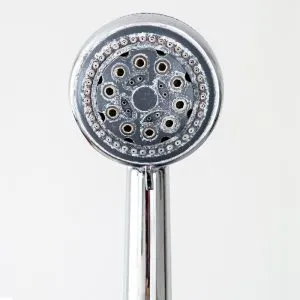Hard water, characterized by a high concentration of minerals like calcium and magnesium, is a common issue in many households. While it’s safe for consumption, hard water can have different implications for hair care.
Washing hair with hard water often leads to hair problems such as dryness, dullness, and buildup, which can affect the health and appearance of your hair.
Read this article to know the challenges of using hard water for hair washing and decide if you should use hard water for washing your hair or not!
What is Hard Water?
Contrary to what it sounds like, hard water isn’t ice or snow! Hard water is water that is high in mineral content.
Even though most of us get our water from turning on a tap (or from bottles!), we should never forget that all water originates from surface water sources such as lakes, rivers, oceans, or saturated groundwater zones located underneath the surface of the land.
Hard water has been exposed in some way to limestone, chalk, or gypsum deposits, all of which are high in calcium, magnesium carbonates, bicarbonates, and sulfates. While these minerals may have some health benefits for our bodies, they aren’t the best thing for our hair.
Signs Your Hair Is Suffering from Hard Water
Here are five signs that your hair may be suffering due to hard water, along with practical solutions to mitigate these effects:
Dry Hair: Hard water’s mineral content can form a film on the hair, preventing moisture absorption and leading to dryness. Despite using moisturizing products, hair might still feel straw-like.
Limp Locks: Mineral buildup can weigh down hair, making it appear limp and lifeless, and sometimes even greasy despite recent washing.
Itchy Scalp: The buildup from hard water minerals can also affect the scalp, causing dryness and itchiness due to follicle blockage and inflammation.
Thinner Hair: Over time, mineral deposits can lift the hair cuticle, weakening the strands and leading to increased tangling and breakage, making hair appear thinner.
Faded Hair Color: Hard water can interfere with hair dye by preventing the cuticle from sealing properly, leading to quicker color fade.
Solutions to Hard Water Hair Problems
Specialty Shampoos: Utilize clarifying or chelating shampoos to remove mineral buildup. These shampoos can be drying, so limit use and always follow with a hydrating conditioner.
Apple Cider Vinegar Rinse: An apple cider vinegar rinse can help dissolve mineral buildup, restoring shine. Mix 1 tablespoon of vinegar with 2-3 cups of filtered water, apply after shampooing, and rinse thoroughly after a few minutes.
Water Softeners: Installing a whole-house water softener can convert hard water into soft, significantly reducing mineral content and protecting both hair and skin.
Showerhead Filters: A more affordable option is to install showerhead filters that specifically remove minerals from water, helping to mitigate hard water’s effects on hair.
Deep Conditioning Treatments: Regular deep conditioning can help replenish moisture and protect hair from the drying effects of hard water. Look for products rich in hydrating ingredients.
How to Protect Hair from Hard Water

The water in our homes comes from the resources available in our cities and towns. We don’t have much say in the matter, and unless we petition the powers that be to treat our water at the source, we’re stuck with what we get.
But there are a few simple tricks you can do to soften the water you use to wash your hair without fighting against your municipality or spending a fortune:
- Boil it first. Boiling removes calcium, resulting in softer water.
- Install a showerhead with a water-softening filter. An activated carbon filter can help remove chlorine, minerals, and other substances.
- Use vinegar to reduce build-up in faucet heads, showerheads, and pipes.
- Use soaps and specially formulated shampoos to combat the minerals and chlorine in hard water.
For a temporary solution, especially when traveling, using bottled or filtered water for the final rinse can help.
Can Hard Water Make Hair Greasy?
Yes, hard water can make hair appear greasy due to the buildup of minerals like calcium and magnesium on the hair and scalp. This buildup can hinder proper cleansing and lead to a residue that makes hair look oily.
Make up for hard water’s harshness and damaging effects by investing in high-quality hair conditioners and moisturizing leave-in creams, and switch around your shampoos to remove excess mineral buildup.
So, while washing hair with hard water poses challenges, it is not insurmountable. By understanding the effects and implementing appropriate solutions, one can maintain healthy and vibrant hair even in areas with hard water.
